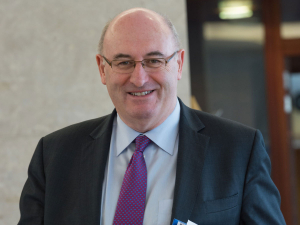EU Agriculture Commissioner Phil Hogan is optimistic that a quality free trade agreement (FTA) between the EU and NZ can be negotiated before the end of 2019.
Hogan is responsible for the agricultural dimension of the FTA from a EU perspective.
He says good progress is being made in the negotiations, of which there are three more formal rounds scheduled before mid 2019.
“I am optimistic that not only can we do a deal, but a quality deal,” he told Rural News.
Hogan, who grew up on the family farm in Ireland before moving into politics, says agriculture will always be a sticking point with NZ because it is a sensitive issue with European farmers. But he’s confident that a deal can be negotiated and that 98% of the tariffs and other impediments to trade can be lifted, leading to greater trade liberalisation.
Two major issues are of concern to NZ: tariff rate quotas (TRQs) which affect access of sheep-meat to the EU, and geographic indicators (GIs) which mainly affect the dairy industry.
Hogan says the TRQs are more related to Brexit and are an issue for the World Trade Organisation (WTO) to deal with.
However, he believes the issues on GIs can be resolved. An example of a GI is the name given to a particular cheese such as Gouda, which is linked to a specific town or region in a country.
“Geographic indicators I suppose can be described as rural intellectual property in the EU,” he said. “They are well accepted [in NZ] in the wine industry, but now there are one or two names in the dairy sector that we are worried about. But I think we can resolve those.”
The positive side is the great deal of good will around the FTA negotiating table.
“It would be unthinkable, in an era when there is so much global disturbance on many issues, that the same values and objectives of like-minded countries like NZ and the EU couldn’t do a deal.
“If Mr Trump wants to remain protectionist we have to remain open for business and we are very strong supporters of the multilateral trading system,” he adds. “As a result of this, I think NZ and the EU will come to an agreement.”



















